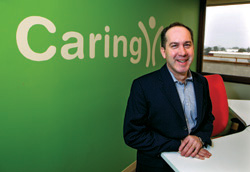What will you do with your life post-retirement?

Andy Cohen: “Hurting yourself in you home,
such as breaking a hip by falling, is the
No. 1 reason that people can’t live
independently. Updating doors with levers,
widening frames for walkers—these are
ways to make your home universal-design
safe.” Photo by Norbert Von Der Groeben.
Retiring is refocusing priorities.
For Kathy Bussing, retirement meant championing a passionate cause. “I’m practicing law, just in a different way,” says Bussing, who retired from Husch Blackwell’s insolvency and commercial bankruptcy group.
“I’m a court-appointed special advocate for children in Jackson County, Mo.,” she says. “For years, I fit pro bono CASA cases in around my billable work because child welfare issues are important to me. But I never thought I’d practice family law.”
Instead of a paycheck, Bussing receives another type of reward.
“When I see kids who were abused or neglected leaving our court system better than they were when they came in,” she says, “that keeps me going.”
Retirement offers time to explore options.
“Before retirement, I thought about where to contribute my skills,” Bussing says. “Many not-for-profits need legal help. I’d encourage retiring attorneys to … be involved in your community.”
If retirement is to be a pursuit of another career, a degree or interesting studies, consider the benefits of a 529 tax-advantaged plan. Taxes aren’t paid on withdrawal so long as funds go to qualified expenses incurred at higher educational institutions that qualify for federal student aid. For example, travel to New York University’s Florence campus for class isn’t a qualified expense, but tuition and books are. More information about 529s is available at the U.S. Securities and Exchange Commission’s 529 website.
Click here to read the rest of “Retirement Reset” from the May issue of the ABA Journal.



